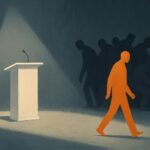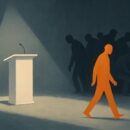Freeing ourselves from the prison of self-centredness
As we embark on rebuilding this nation, we mull over the losses we have incurred over the past two decades. What exactly did we lose? We certainly lost law and order; economic investment and growth; institutions and governance; roads and power lines. All of these can be reclaimed. Indeed, we are embarking on a journey of renewal on all these fronts. But I fear our greatest loss was more insidious and more damaging still. I refer to the loss of care and concern for those around us – ‘me-and-mine’ syndrome.
If you ask the average Kenyan some pointed questions (and the average Kenyan actually gave you a truthful answer – which would probably require him or her to be drunk), here is what you might hear:
Question: “Who is the most important person in your life?” Truthful answer: “ME!”
Question: “Why so?” Truthful answer: “Because I can only care about other people if I’m OK. If my needs are fulfilled, if I’m comfortable and happy, then I could possibly think about others.”
Most of us operate in this way. We build a web of relationships with ourselves at the centre, and we place spouses and offspring, relatives and friends, compatriots and countrymen progressively farther away from the centre. The farther someone is away from the centre of the web, the less we are willing to do for him or her. And the truth of the matter is that only the relationship right at the centre – the relationship with oneself – is sacred. All others are expendable.
And so we live in cocoons of self-centredness. We feed and clothe ourselves and our offspring first. Everything else is somebody else’s problem. The ‘me-and-mine’ syndrome is an ugly thing to see. People will run out into their gardens if they hear their own children screaming, but not into the street if they hear their neighbour’s child. They will feed themselves to bursting point whilst starving street-children watch from the other side of the railings. As long as ‘we’ are OK, ‘they’ don’t matter.
To see this in action, you only need to have the misfortune to be caught up in a Nairobi traffic jam. Why is it that if there’s a brief drizzle in Kilimani, or if some students start a minor affray on University Way, or if the President decides to go out for a quick spin, the whole of Nairobi seizes up? Because at the first sign of trouble on the roads, ‘me-and-mine’ rears its ugly head. I must get home quickly. I must get to that junction first. I will drive on the wrong side of the road to do so. I will intimidate every driver around me and exchange obscenities and even blows, just to gain a few metres on everyone else.
The idea that we’re all in it together, that the best thing to do is to sit patiently in your lane and wait, does not even seem to occur to any Nairobi driver. And so people will drive on pavements and on incoming lanes. They will have accidents. The result: total gridlock for everyone. The most belligerent idiots do not in the end get home any sooner than anyone else, but they do cause the problem to worsen ten-fold.
‘Me-and-mine’ emerges when we look at the national ‘cake’. We treat economic well-being as a zero-sum game where the desirable result is my gain, your loss. The winning strategy in this game is to acquire power and get into the bidding early. If you are an MP, you must put your own interests above menial types like teachers and policemen. You must award yourself the biggest possible share of the cake at the earliest possible opportunity. What if this means reneging on an electoral promise to the teachers, made when you needed them most? Too bad! They’re at the bottom of the food chain. Suckers!
If you are a textile-industry worker, you must urge your fellows to riot and strike before those greedy sugar-workers do. If you are the head of a parastatal, you must indulge in an intensive feeding frenzy before you are deposed in a purge. If you are a busy executive, you must spend much of your time building your network of duplicitous relationships and kissing all the right backsides, in order to secure that second house and the right schools for your kids, so that they too repeat the ‘me-and-mine’ life cycle.
And then you die, having lived a life that rarely extended beyond your own nose. A life in which you secured your own comforts and nest eggs, yes; but one in which you failed to connect with the true riches of the universe around you.
The paradox is that in order to prosper, we need everyone else around us. What good is better pay to MPs if the education system goes down the drain? What good is your new car without policemen to protect it? What use is it to lead a busy and stressful life without a health system to look after you? Yet the ‘me-and-mine’ focus prevents us from building an inter-connected country, prevents us from seeing linkages, prevents us from planning for interaction.
In fact, who exactly is this ‘me’ that so obsesses us? A good man once told me: “The planet Earth is but a mere speck in the huge universe. You are but a mere speck of life on this Earth. So that is what you are – a speck on a speck. Don’t take yourself at all seriously.” We only have importance as a part of a greater whole. We only have meaning as an element in a bigger idea. In themselves, our lives are irrelevant events in the maelstrom of existence.
The idea that there is only one life in this universe, and that we – in common with the birds, the trees, the stars – are but one speck of this life – has long been known by the greater and wiser men and women who have walked amongst us. Albert Einstein put it thus: “A human being is part of the whole called by us ‘the Universe’, a part limited in time and space. He experiences himself, his thoughts and feelings, as something separate from the rest; a kind of optical delusion of the consciousness. This delusion is a kind of prison for us, restricted to our personal desires and to affections for a few persons nearest to us. Our task must be to free ourselves from this prison by widening our circle of understanding and compassion to embrace all living creatures and the whole of nature and beauty.”
We live in a shared space. The truly happy moments in our lives are when we give happiness to those around us. No one has ever received long-lasting happiness from securing that larger paycheck, or from beating the rush. There is an inner being in us yearning to connect with the larger whole. The only way to do this is to give: give love, give kindness, give help. So when you’re next in the middle of a seething, fuming traffic jam, giving as good as you get, reflect on just how small you’ve made yourself.
Now, if you’ll forgive me, I must tend to my own affairs and address those dear to me.

Buy Sunny Bindra's new book
The X in CX
here »
Popular Posts
- Where are you rushing to—your funeral?June 29, 2025
- The map will appear—once you start walking.July 6, 2025
- We’re letting the bad drive out the goodJuly 20, 2025
- How to spot a real thinkerJune 15, 2025











